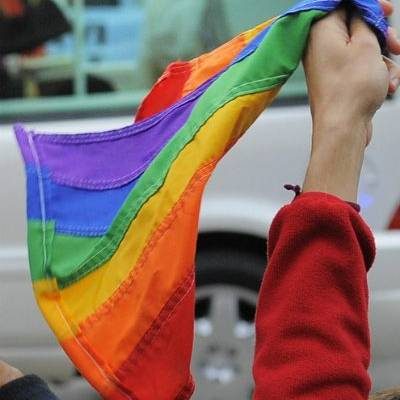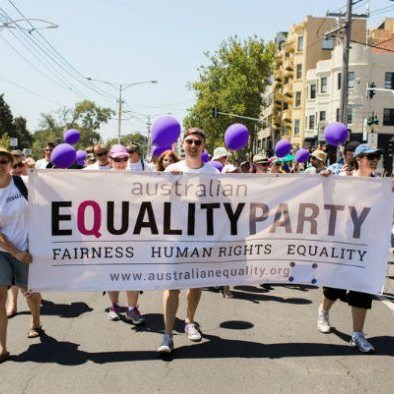To create total equal rights in all areas of the law for gay, lesbian, bisexual transgender, intersex and queer (GLBTIQ) people.
To create total equal rights in all areas of the law for gay, lesbian, bisexual transgender, intersex and queer (GLBTIQ) people.
Despite many freedoms and liberties we enjoy today as the result of decades of protest, agitation and reform, the Australian Sex Party is concerned that existing legislation and policy in Australia is largely insufficient to protect gay, lesbian, bisexual, transgender, intersex and queer people from discrimination, harassment, homophobia, transphobia and biphobia, persecution and inequality.
Although the Australian Sex Party welcomes the amendments of 58 laws discriminating against same-sex couples and their children in the area of federal financial and work-related entitlements in 2008, we acknowledge that there remain significant holes in federal and state legislation and policy in a range of areas. Churches, schools and other institutions can still discriminate on the basis of sexuality. Same sex couples continue to be denied equal rights in relation to marriage, adoption, and the age of consent. Gay men are four times more likely to be assaulted than other men and lesbians six times as likely as other women. The Australian Sex Party advocates a range of legislative measures coupled with concurrent community campaigns about rights awareness and education. We promote policies that ‘speak up for an inclusive Australia’ , target the shame, isolation and internalised stigma affecting children, and aim to promote positive messages about sexuality and diversity.
Marriage
In 2009 a Galaxy Poll conducted by Australian Marriage Equality found that 60% of Australians support giving same-sex couples the right to marry. Despite strong community support for gay marriage rights in Australia, the Marriage Act 1961 Cth continues to define ‘marriage’ as ‘the union between a man and a woman’, and section 88EA does not recognise couples married in other countries. In November 2009 the Senate Legal and Constitutional Affairs Committee failed to endorse the Marriage Equality Amendment Bill 2009, notwithstanding that the right to marry for same sex couples is now granted in Canada, Spain, the Netherlands, Belgium, Norway, Sweden, South Africa and five US states. In addition, a civil union or registered partnership scheme is available in Finland, the United Kingdom, New Zealand, Denmark, Switzerland and a number of other nations. The Australian Sex Party believes that existing marriage legislation in Australia produces a hierarchy of relationship recognition and that marriage legislation should not discriminate on the basis of gender identity or sexual preference. We believe that providing legal protection and recognition of all relationships is needed to bring Australia back on par with current international standards.
Adoption and Parenting
The Australian Sex Party supports the rights of same sex couples to be legally recognised in their capacities as parents or carers, whether they are biological or non-biological parents, long-term foster carers, step-parents or co-parents, or in arrangements of traditional or gestational surrogacy, local or inter country adoption, or kinship.
In Australia, the law governing who may adopt and be recognised as a parent is largely contained in state and territory legislation and varies accordingly. In January 2010, the NSW government rejected proposed amendments to include same sex couples in the definitions of ‘couple’ and ‘de facto relationship’ in the Adoption Act 2000, despite that adoption by same sex couples is legal in a number of countries including the United Kingdom, Denmark, the Netherlands, Iceland, Andorra, Belgium, Norway, South Africa, Spain and Sweden. The Australian Sex Party is concerned that discrimination in adoption law sends a harmful message about the risk of lesbians and gay men to their children and discourages same sex couples from becoming foster parents. As the NSW Gay and Lesbian Rights Lobby note, it ‘stigmatises and offends the dignity of thousands of lesbian and gay parents, and lesbian and gay men who work with children and young people.’
The Australian Sex Party is further concerned that Australia’s existing adoption legislation denies equal rights to both same sex couples and their children and is in breach of international treaty obligations. The Australian Human Rights Commission found in 2007 that denying a child legal recognition of their parents may interfere with fully realising the child’s human rights under the Convention on the Rights of the Child (CRC). The NSW Gay and Lesbian Rights Lobby note that ‘blanket discrimination’ against same-sex couples in adoption law ‘prevents an objective case-by-case assessment of what is in an individual child’s best interests’ as required by the Convention. Article 2(2) of the CRC specifically states that a child should be protected from all forms of discrimination on the basis of the status of the child’s parents, legal guardians or family members. The UN Committee on the Rights of the Child has further articulated that young children in particular need special protection where they are born to socially marginalised families.
Research literature over the last three decades has illustrated that the sexuality of a child’s parents has no connection to a child’s moral and cognitive development, wellbeing or happiness, and such findings are supported by the Australian Psychological Society, Victorian Law Reform Commission, Canadian Department of Justice and the Australian Medical Association. Same-sex adoption reform has the support of the NSW Law Reform Commission, Australian Human Rights Commission, Victorian Law Reform Commission and the Tasmanian Law Reform Institute. Giving same sex parents the ability to legally formalise existing relationships with their children would also confer benefits such as automatic inheritance rights, child support obligations and financial and emotional stability.
The Australian Sex Party is committed to equal access to adoption, fostering, artificial insemination and in vitro fertilisation procedures for all people on the basis of their ability to provide a loving home rather than on the basis of their sexuality and gender identity. In line with the recommendations of the Gay and Lesbian Rights Lobby, the Sex Party recommends removing discrimination against same-sex couples in adoption eligibility, and giving further consideration to legally recognising children living in multi-parent families. We believe these measures would give relinquishing parents a wider range of diverse families to chose from and reflect prevailing international developments.
Human rights and anti-discrimination
The Australian Sex Party is concerned that there is currently no comprehensive federal legislation that prohibits discrimination against GLBTIQ people on the basis of sexual orientation. The ad hoc and piecemeal establishment of anti-discrimination laws across states and territories mean that protections are inconsistent across jurisdictions, and there remain broad exemptions that allow discrimination to continue in private schools, religions organisations and employment involving children. Recent studies reveal that 59% of GLBTIQ people experience harassment and/or prejudicial treatment on the basis of their sexual orientation or gender identity in the workplace, including sexual and physical assault, verbal abuse, destruction of property, ridicule, belittling and homophobic jokes.
The Australian Sex Party believes that Australia could better protect human rights of GLBTIQ people through a number of steps. Constitutional amendments could enshrine human rights obligations such as the right to equality and equal treatment under the law without discrimination on the basis of sexual orientation. The enactment of state and federal human rights acts could protect a number of human rights recognised at international law and require parliament to consider how laws impact on human rights, provide effective remedies when human rights have been violated, and respect human rights when developing policy. Federal anti-discrimination legislation should be enacted to address discrimination on the basis of sexual orientation, and state and territory exemptions should be reviewed to ensure they are nationally consistent, and limited in accordance with the underlying rationale for the existence of the exemption. Any legislative change should be implemented in combination with public education programs that discuss homophobia, prejudice, and human rights. Such an approach is long overdue to ensure that all people receive equal protection under the law.
Sex and gender diversity
The Australian Sex Party believes all people have a right to choose their gender identity and choose when to disclose it. We are concerned that non-consensual normalisation treatments such as forced gender assignment for intersex people continue to exclude and marginalise genders that fall outside the narrow male-female binary currently codified in the legal system. Instead of pathologising bodies and gender identities, the Australian Sex Party supports legislative measures that recognise a range of genders including intersex, MTF trans, FTM trans, genderqueer or genderless, and promote socio-cultural attitudes of acceptance, visibility and celebration. We recognise that intersex is not a medical condition and that all humans are born with diverse and varying hormones, anatomy, organs and chromosomes. We support people born intersex making their own informed decisions as to if and when they wish to undertake gender assignment. We promote a human rights approach that provides protections against discrimination, and which ensures that community education about sex and gender diversity is provided to medical personnel, psychological experts, sexologists, sociologists, employers, educational institutions, carers and government departments.
In October 2009 the Australian Passport Office issued an apology to transsexual woman Stefanie Imbruglia when she brought an action against DFAT with the Australian Human Rights Commission alleging breach of Australia’s obligations under the International Convention on Civil and Political Rights, because they had knowingly placed her in danger by refusing to issue her a passport that reflected her identity. In July 2007 Imbuglia had applied to the Office for a female passport so she could travel to Thailand for sex realignment surgery and was told by the Office that because she was registered as male at birth she would only be able to travel on a male passport despite having lived as female for two years and had specialist letters confirming her ongoing treatment. While a one-year passport was previously available to people travelling abroad for surgery, the Howard government had rescinded the right in 2007 without any consultation with specialist groups. Travelling abroad on a passport that did not reflect her gender identity meant she was susceptible to stop and searches, intimidation, arrest, violence and embarrassment.
In their comprehensive report, The Sex Files: Sex and Gender Diversity in Documents and Government Records, the Australian Human Rights Commission advocates a number of recommendations ‘to create a fairer and less complicated identification system that recognises sex and gender diversity.’ The Australian Sex Party advocates the implementation of those recommendations to advance human rights protections for all sex and gender diverse people, including access to relationship recognition, implementing policies that include the use of a person’s preferred title and pronouns on all records, and the ability to change of legal documentation such as birth certificate based on self-identification. We believe that issuing appropriate documents to sex and gender diverse people and changing terminology to be more inclusive, is an important step towards gender equality.
Persecution
The Australian Sex Party recognises that worldwide people continue to suffer persecution in their own countries on the basis on their sexuality or gender identity, and supports their granting of political asylum on humanitarian grounds. We support the development of further training programs for the Refugee Review Tribunal in developing policies and procedures to improve the determination of sexuality related claims, to develop Tribunal Members’ understandings of sexual diversity, attune Members to the impact of actual or perceived homophobia in the determination process, and in using human rights jurisprudence as a tool to improve consistency in decision-making.
Age of Consent
The Australian Sex Party is concerned that, while most states and all territories in Australia have an equal and consistent age for homosexual and heterosexual sex (16 years), in Queensland, s215 Criminal Code 1899 continues to make anal sex unlawful until the age of 18, with a maximum penalty of 14 years. The Australian Sex Party believes that discriminatory age of consent laws overwhelmingly affects young gay men and are inconsistent with the objectives of Queensland’s Anti Discrimination Act 1991. Defining anal sex under 18 years of age as a criminal activity has no health, welfare or policy benefit, prohibits 16 and 17 year old gay boys from developing positive friendships, relationships and networks and undermines educational efforts to address young people’s sexual health practices. The Australian Sex Party supports nationally consistent age of consent laws.
Respecting and celebrating diversity
The Sex Party believes that all people have the human right to choose their sexuality and identity, and is proud to celebrate a diverse community. We offer hopeful visions towards a world where individuals and couples can enjoy equal access to health, legal and education systems, marriage and adoption and other environments without discrimination, vilification, harassment, disadvantage, exploitation, stigma or isolation. The Sex Party believes in making legislative amendments in combination with greater GLBTIQ community consultation on policies that affect GLBTIQ people, provision of counselling, peer support, coming out, suicide prevention and housing and community services for young GLBTIQ people, as well as a national sex education curriculum that provides information comprehensive and street-wise information for youth on sexual variance, gender identity, diversity, gender based harm, cross cultural conceptions of gender, new technologies, negotiating sex and safer sex.



